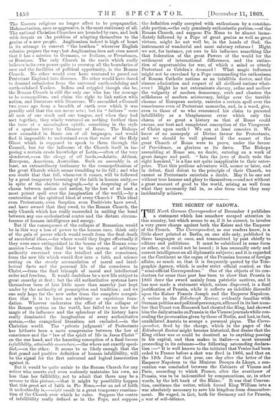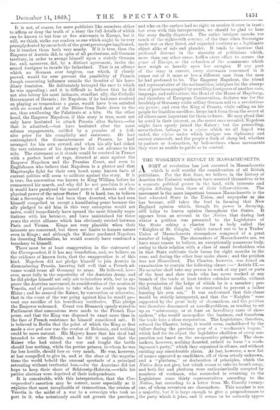THE SECRET OF SADOWA.
THE North German Correspondent of December 4 publishea a statement which has somehow escaped attention in this country, but which seems to us, if it be correct, to involve a very grave charge against both the Kaiser and the Emperor of the French. The Correspondent, as our readers know, is a little sheet printed at Berlin, on one side only, published in three languages at once, and transmitted by post chiefly to. editors and politicians. It must be subsidized in some form or other, or it could not be issued ; it has unusually early and. correct intelligence on all diplomatic subjects; and it is regarded on the Continent as the organ of the Prussian bureau of foreign affairs, so much so, that it is frequently quoted by the Tele- graphic Agency, which is under strict official control, as the "semi-official Correspondenz." One of the objects of its con- ductors for some time past has been to show that Prussia in 1866 drew the sword mainly from patriotic motives, and it has now made a statement which, unless disproved, is a final justification of Prussia, while it reflects an indelible discredit upon the Kaiser Francis Joseph and the Emperor Napoleon. A writer in the Edinburgh Review, evidently familiar with German politics and political personages, affirmed in its last num- ber that Count von Bismarck had cheated the King, had showed him the daily attacks on Prussia in the Vienese journals while con- cealing the provocation given by those of Berlin, and had, in fact, annihilated Austria to avenge a personal pique. The Corre- spondent, fired by the charge, which in the pages of the Edinburgh Review might become historical, first denies that the King either was or could be deceived as to anything passing in his capital, and then makes in italics—a most unusual proceeding in its columns—the following astounding declara- tion :—" It is well known to the initiated that Venice had been ceded to France before a shot was fired in 1866, and that on the 12th June of that year, one day after the letter of the Emperor Napoleon to the Minister Drouyn de Lhuys, a con- vention was concluded between the Cabinets of Vienna and Paris, according to which France, after the overthrow of Prussia, was to be indemnified by compensations, or, in other words, by the left bank of the Rhine." It was that Conven- tion, continues the writer, which forced King William into a war absolutely necessary to save his kingdom from dismember- ment. He waged, in tact, both for Germany and for Prussia, a war of self-defence.
It is not, of course, for mere publicists like ourselves either to affirm or deny the truth of a story the full details of which can be known to but four or five statesmen in Europe, but it will, we think, strike our readers as one which ought to be very promply denied byone or both of the greatpersonages implicated, for it touches them both very nearly. If it is true, then the Emperor of Austria did, in spite of all professions, sell German territory, in order to avenge himself upon a strictly German foe, and, moreover, did, by a distinct agreement, invite the armed foreigner to invade the fatherland. That is an offence which no German ever forgives, one which, if clearly proved, would for ever prevent the possibility of Francis Joseph recovering influence outside the frontier of his here- ditary dominion. He deliberately betrayed the race to which he was appealing ; and it is difficult to believe that he did not also betray his most intimate, steadfast ally, the Catholic Government of Bavaria ; for Napoleon, if he had once resolved on playing so tremendous a game, would have ben satisfied with no reward short of the Rhine from Basle down to the sea, thus swallowing the Palatinate at a bite. On the other hand, the Emperor Napoleon, if this story is true, must not only have hesitated to attack Prussia after Sadowa,—for that is admitted,—but have hesitated after the most solemn engagements, ratified by a promise of a defi- nite price for his complicity and assistance. He had contemplated the dismemberment of Prussia, he had arranged for his own reward, and when his ally had risked the very existence of his dynasty he did not advance to his side. The statement as it stands would be received in France with a perfect howl of rage, directed at once against the Emperor Napoleon and the Prussian Court, and even to Englishmen who believe that Napoleon is a plotter and that Hapsburghs fight for their own hand, many known facts of current politics will seem to militate against the story. If it is true, the convention was known to King William before he commenced his march, and why did he not proclaim it when it would have paralyzed the moral power of Austria and the physical power of the minor States ? It is hard, too, to believe that a Sovereign who had been thus deserted, who had seen himself compelled to accept a humiliating peace because the ally pledged to aid him in this very enterprise would not move, could immediately have opened the most friendly nego- tiations with his betrayer, and have maintained for three years the strict affiance which has obviously existed between Paris and Vienna. Kings are very placable when their interests are concerned, but there are limits to human nature even in Kings ; and although the Kaiser pardoned Napoleon for deserting Maximilian, he would scarcely have condoned a treachery to himself.
There must be at least exaggeration in the statement of the Correspondent, if it has any foundation, and, we believe, on the evidence of known facts, that the exaggeration is of this kind. Napoleon did not pledge himself to join Austria in dismembering Prussia, knowing full well that a French ad- vance would rouse all Germany to arms. He believed, how- ever, most fully in the superiority of the Austrian Army, and he did pledge himself not only not to interfere with, but to ap- prove the Austrian movement, in consideration of the cession of Venetia, and of permission to take what he could upon the Rhine ; and he assured the Kaiser, by convention or otherwise, that in the event of the war going against him he would pre- vent any sacrifice of his hereditary territories. This pledge the Emperor redeemed. Count von Bismarck openly stated in Parliament that concessions were made to the French Em- peror, and that the King was disposed to exact more than in the face of French resistance he himself considered safe. It is believed in Berlin that the point of which the King at first made a sine qud non was the cession of Bohemia, and nothing could be more natural. His Majesty knew that his rival had intended to seize Silesia, and he felt it unjust that the Kaiser who had raised the war and fought the battle should lose nothing, while the pettier princes, to whom he was far less hostile, should lose so very much. He was, however, at last compelled to give in, and at the close of the negotia- tions the world beheld the unusual spectacle of a principal retreating without territorial loss,—for the Austrians did not hope to keep their share of Schleswig-Holstein,—while his pettier abettors were deprived of their independence.
It is conceivable, with this interpretation, that the Cor- respondent's assertion may be correct, more especially as it explains that most inexplicable of transactions, the cession of Venetia in the midst of a war to a sovereign who took no part in it, who notoriously could not govern the province,
and who on the surface had no right to receive it even in trust ; but even with this interpretation, we should be glad to hear the story finally disproved. The entire intrigue smacks too much of the eighteenth century, of the time when Sovereigns made war as they listed, and regarded territory as a legitimate object alike of sale and plunder. It tends to increase that profound distrust in the sincerity of politicians which, more than any other cause, baffles every effort to secure the peace of Europe, or the reduction of the armaments which now weigh so heavily upon her energies. If any part of the story is correct, every statesman concerned in it comes out of it more or less a different man from the man he had professed to be. The Emperor Napoleon, the friend and representative of the nationalities, intrigues for the absorp- tion of provinces peopled by unwilling foreigners of another race, language, and cultivation; the Head of the House of Hapsburg, and therefore of European Conservatism, declares war for the headship of Germany while selling German soil to a revolution- ary power; and even the King of Prussia, while calling on his people for limitless sacrifices, keeps back from them the secret of all others most important for them to know. He may plead that he acted in their interest, as, the secret once revealed, Napoleon might have openly joined the Kaiser ; but the proceeding, nevertheless, belongs to a re'yinre which we all hoped was ended, the re'gitne under which intrigue was diplomacy and secrecy statecraft, and the people a flock of sheep led, whether to pasture or destruction, by bell-wethers whose movements they were as unable to guide as to control.







































 Previous page
Previous page